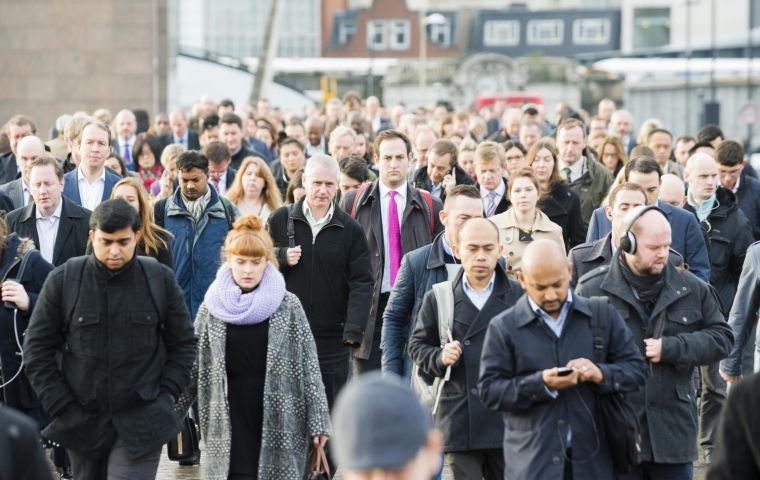MercoPress. South Atlantic News Agency
UK record employment in 2018 fourth quarter; jobless rate 4%, lowest since 1975
 The jobless rate at 4% is the lowest since early 1975. Weekly average earnings went up by 3.4% to £494.50 in the year to December - after adjusting for inflation
The jobless rate at 4% is the lowest since early 1975. Weekly average earnings went up by 3.4% to £494.50 in the year to December - after adjusting for inflation The number of people in work in the UK has continued to climb, with a record 32.6 million employed between October and December, the latest Office for National Statistics figure show. Unemployment was little-changed in the three-month period at 1.36 million.
The jobless rate, remaining at 4%, is at its lowest since early 1975. Weekly average earnings went up by 3.4% to £494.50 in the year to December - after adjusting for inflation, that is the highest level since March 2011.
The number of people in work between October and December was up 167,000 from the previous quarter and 444,000 higher than at the same time in 2017.
The employment rate - defined as the proportion of people aged from 16 to 64 who are working - was estimated at 75.8%, higher than the 75.2% from a year earlier and the joint-highest figure since comparable estimates began in 1971.
Employment Minister Alok Sharma said: “While the global economy is facing many challenges, particularly in sectors like manufacturing, these figures show the underlying resilience of our jobs market - once again delivering record employment levels.”
ONS deputy head of labor market Matt Hughes said: “The labor market remains robust, with the employment rate remaining at a record high and vacancies reaching a new record level.
”The unemployment rate has also fallen, and for women has dropped below 4% for the first time ever.“
However, Andrew Wishart, UK economist at Capital Economics, warned that next month's figures may not be so buoyant.
”The labor market data didn't reflect the slip in hiring surveys in December, with employment rising,“ he said.
”However, the surveys deteriorated more markedly in January, so a Brexit effect might start to weaken employment growth in the next batch of official data.”




Top Comments
Disclaimer & comment rulesCommenting for this story is now closed.
If you have a Facebook account, become a fan and comment on our Facebook Page!